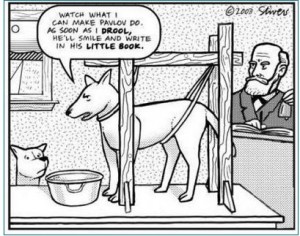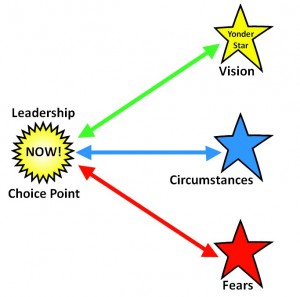 In the 1920s Ivan Pavlov conducted a series of very famous experiments in which he taught dogs to salivate at the ringing of a bell. If PDAs had been invented, he could have taught the dog to salivate when his cell phone received a call, email or text. He might have even taught the dog to bark so he would never miss an “incoming!”
In the 1920s Ivan Pavlov conducted a series of very famous experiments in which he taught dogs to salivate at the ringing of a bell. If PDAs had been invented, he could have taught the dog to salivate when his cell phone received a call, email or text. He might have even taught the dog to bark so he would never miss an “incoming!”
Much of what we observe in the behavior of those around us looks very similar. Despite frequent complaints about the number of emails and the expectations of immediate responses, PDAs are everywhere and constantly being checked. In our executive groups, members used to talk with each other at breaks. Now they all tend to get on their PDAs, and a good number are peeking throughout the meeting as well. Are you a victim of your PDA? What in the world is it all about?
According to Wikipedia, “classical conditioning, (also Pavlovian or respondent conditioning, Pavlovian reinforcement), is a form of associative learning that was first demonstrated by Ivan Pavlov in 1927. Associative learning is the process by which an element is taught through association with a separate, pre-occurring element.” In the case of the dog’s brain, that pre-occurring association was the smell of meat powder. What are your (probably multiple) prior associations that cause you to frantically and fanatically check your mobile device? A good friend, Brian Stuhlmuller of Distinctions, Inc., points out that most of us are unconsciously afraid that one of those emails in that unmanageable onslaught of incoming that we get every day, (and generally don’t get to all of), “is going to get us.” Failure to respond will cost us a deal, a relationship or something we highly value. It’s “the boogeyman just below the window on your iPad screen.”
I have been reflecting on myself in this regard and can see that I have unconscious concerns that someone is going to be mad at me, think I’m a flake, or perhaps even drop me from their circle. A client might have asked for something important to them and decided I’m unreliable or worse, irresponsible. I even see that there are some old beliefs in my group of associations like “in a well run office, people answer the phone in two rings or less.”
If you recognize you have your own version of Pavlov’s dog, and would like to break out of it, take bold action. For example, delete all of your inbox at midnight on New Year’s Eve and on regular dates throughout the year. If that’s too bold, go “off line” for significant parts of your day and week. Listen to your mind. Log the internal dialogue. Discover the associative learning that runs your life around email and texting. Self-observation is the key to freedom.
If you can recognize what’s driving you, you are at the Leadership Choice Point™. Perhaps it’s all fear that has you dancing to your PDA or maybe it’s just trying to manage your circumstances so you can survive another day. Is that really any different? You are either on the Red Line or the Blue Line of the diagram. Choosing to pursue your vision/intention and your own priorities over reacting will start you up the Green Line.

Which path will have your life more productive, satisfying, and fulfilling? If you are leading a company or a team, which way will have your associates be more productive and less stressed? What are you waiting for?
